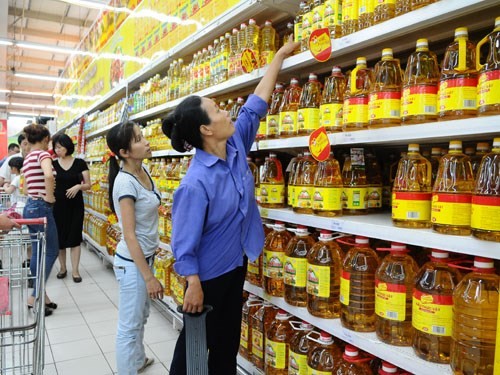(VOVworld) – In recent years, fast-moving consumer goods (FMCG) or consumer packaged goods (CPG) have grown rapidly in both rural and urban areas of Vietnam. Products like milk, alcoholic beverages, soft drinks, and school notebooks have been a growing share of the domestic market. This is a major opportunity for Vietnamese enterprises in the field to expand production and markets in 2016.
Fast-moving consumer goods are predicted to generate about 140 billion USD in turnover this year. But international integration is challenging fast-moving consumer goods firms, who have limited financial capacity and are dependent on imported materials. New free trade agreements could create increased competition for Vietnamese companies in this area.
 |
Vietnam’s fast-moving consumer market is now a magnet for foreign investors as it is expected to outpace major markets like India and China with an annual growth rate of 20 percent by 2020. (Photo: vietnamnet.vn)
|
Le Thi Hoang Yen, director in charge of communications and marketing support for the Nestle Company in Vietnam, said “Vietnamese distributors and retailers must improve their competitiveness. Small-scale companies and shops used to traditional trading need to be trained to meet the requirements of modernization and consumers’ changing preferences.”
According to Phan Chi Dung, head of the Light Industry Department of the Ministry of Industry and Trade (MoIT), rural Vietnamese whose incomes have grown 44% in the past three years are particularly interested in fast-moving consumer goods. But he said only 54% of the FMCG companies’ turnover comes from the rural market.
According to economist Le Dang Doanh, “Vietnam will face severe competition in agricultural and industrial production. Fast-moving consumer goods is the area in which Vietnam has the highest competitiveness and an area which has seen incredible progress. To be able to stand firm in the domestic market against products imported from other ASEAN countries, Vietnamese enterprises should increase their coordination and links themselves into a chain of value.”
 |
| 85% of the Vietnamese population purchase FMCG under promotion at least once per year - Kantar Worldpanel Vietnam. |
80% of domestic consumers trust the quality of made-in-Vietnam fast consumer goods and prefer to buy them. Deputy Minister of Industry and Trade Ho Thi Kim Thoa said domestic businesses should improve their processing capacity and reduce their dependence on imported materials.
She underscored the need for “State management agencies to develop a more transparent market but consumers should protect themselves by giving feedback to companies and management agencies about product origin and labeling. Enterprises must improve their competitiveness, meet consumers’ needs and find ways to protect themselves from fake goods.”
Rural consumers account for 68% of Vietnam’s 90 million people. Increasing market share in rural markets is vital for domestic enterprises, who should further improve their product quality and variety.